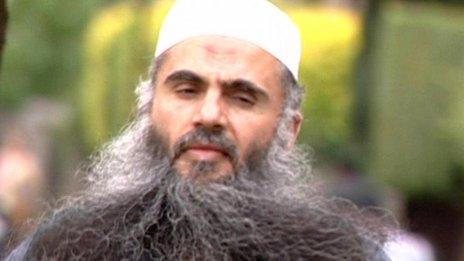Abu Qatada: British minister visits Jordan for talks
- Published
Family friend Marwan Shehada: Qatada may be in Jordan "within one week"
Home Office minister James Brokenshire is in Jordan for talks about Abu Qatada, whom the UK wants to deport.
Abu Qatada, alleged to be a dangerous extremist Muslim preacher, was freed from Long Lartin jail on Monday.
Jordan's minister for legislative affairs, Ayman Odeh, has said he would not be tortured if he returned to stand trial.
A friend of his family has told the BBC they believe Britain will return him to Jordan within the next seven days.
Mr Odeh refused to be drawn on whether he expected the case to be resolved in a matter of days or weeks, but he said Abu Qatada would receive a fair trial.
Mr Brokenshire is seeking reassurances from the Jordanian government about Abu Qatada's treatment if he is sent there.
There is already a "memorandum of understanding" between the UK and Jordan guaranteeing Abu Qatada himself would not be mistreated, but the UK is seeking further assurances.
A judge ended his six-year detention in the UK last week after the European Court of Human Rights (ECHR) blocked his deportation to Jordan. It said evidence obtained by torture might be used against him there.
Abu Qatada was freed on Monday under strict bail conditions,, external including a 22-hour curfew that allows him to leave home only for a maximum of an hour twice a day. He has also been electronically tagged.
He is banned from attending a mosque, leading prayers, publishing any statement, or meeting any of 27 named individuals. Use of a mobile phone or the internet is also prohibited.
Speaking in the Jordanian capital, Amman, journalist Marwan Shehada, a friend of the preacher's family, said Abu Qatada had asked the British government to request a guarantee from the King of Jordan that he would be given a fair trial.
Mr Shehada said he thought Abu Qatada would be happy to return to Jordan if the right guarantees could be secured.
Ayman Odeh, Jordanian minister: "Any torture is prohibited"
The UK government must show significant progress towards deporting Abu Qatada within three months or his bail conditions could be lifted.
Downing Street said "all the options" for removing Abu Qatada from the UK were being considered.
The former Security Minister, Baroness Neville-Jones, who now advises the government on cyber security, says the best option is to work with the Jordanian government to ensure Abu Qatada can get a fair trial there.
She told the BBC: "A co-operative relationship, rather than one government imposing on the other, could indeed be worked out. I don't exclude either some kind of third party element in that.
"There are other agreements of that type which have been worked out with other governments which do indeed contain co-operation. It's a fruitful path and it certainly needs to be pursued with vigour."
But the executive director of the human rights group, Cageprisoners Limited, Asim Qureshi, does not believe Abu Qatada could get a fair trial in Jordan.
"Jordan is a patently unsafe country to send people. It's known for systematic violations of human rights, and that's the point. That's why Britain has to stand out as a bastion to human rights," he added.
- Published26 June 2014

- Published13 February 2012
- Published14 February 2012
- Published9 February 2012

- Published8 February 2012

- Published6 February 2012
